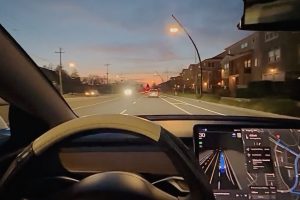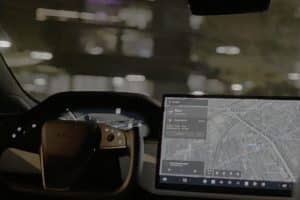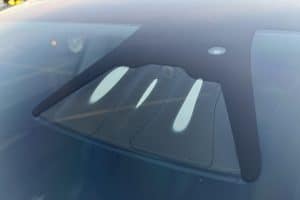- 🟢 Tesla FSD (Full Self-Driving) reportedly received tentative approval in China.
- 🇨🇳 Elon Musk’s recent visit to China coincides with the reported FSD approval.
- 🗺️ Tesla resolved mapping and navigation concerns by allegedly partnering with Chinese tech giant Baidu.
- 🔒 The Baidu partnership addresses data security risks related to FSD in China.
- 💬 During the Q1 earnings call, Musk said releasing FSD in other countries wouldn’t be difficult, requiring some country-specific training.
- 🔩 Musk’s China visit also involved meetings with executives from Tesla China and battery supplier CATL.
- ⚠️ While FSD received tentative approval, final regulatory clearance is still required for its release in China.
- 🌍 Tesla aims to roll out FSD as a supervised autonomy system in markets where regulatory approval is obtained.
In a significant development that could potentially reshape the automotive landscape in China, Tesla has reportedly secured tentative approval for its highly anticipated Full Self-Driving (FSD) system. This groundbreaking achievement comes on the heels of Elon Musk’s recent visit to the country, further underscoring Tesla’s commitment to bringing cutting-edge autonomous driving technology to the world’s largest electric vehicle market.
Overcoming Regulatory Hurdles with Strategic Partnerships
One of the key hurdles Tesla faced in introducing FSD in China was addressing concerns surrounding mapping and navigation functions, as well as data security risks. However, the electric vehicle pioneer has reportedly resolved these challenges through a strategic partnership with Chinese tech giant Baidu.
By collaborating with Baidu, Tesla has gained access to the company’s mapping license, enabling it to collect invaluable data on China’s public roads. This data will prove instrumental in fine-tuning and optimizing FSD’s performance within the unique driving environment of the country.
Moreover, the partnership with Baidu has effectively quelled concerns regarding data security risks associated with FSD. As a reputable domestic tech company, Baidu’s involvement in the project adds an extra layer of trust and compliance with local data privacy regulations.
A Global Vision for Autonomous Driving
During Tesla’s Q1 2024 earnings call, Elon Musk shed light on the company’s global ambitions for FSD, emphasizing the system’s adaptability and ease of deployment across various markets. According to Musk, introducing FSD (Supervised) in other countries would not pose significant challenges, as the system’s end-to-end neural network-based autonomy functions much like a human driver, capable of navigating unfamiliar environments with relative ease.
Musk further elaborated that while country-specific training would be necessary to optimize FSD’s performance, the system’s inherent capabilities allow it to operate reasonably well in almost any market, given regulatory approval. This global vision underscores Tesla’s commitment to bringing autonomous driving technology to the forefront of the automotive industry worldwide.
A Multifaceted Visit with Far-Reaching Implications
Elon Musk’s recent visit to China was not solely focused on FSD. The Tesla CEO also held meetings with key executives from Tesla China, including Tom Zhu and Grace Tao, as well as Robin Zeng, the chairman of China’s leading battery supplier, CATL. These meetings highlight the multifaceted nature of Tesla’s aspirations in the Chinese market, encompassing not only cutting-edge autonomous driving technology but also strategic partnerships and collaborations across the electric vehicle supply chain.
The Final Hurdle: Securing Regulatory Clearance
While the tentative approval for FSD in China represents a significant milestone, it is crucial to note that final regulatory clearance is still required for the system’s official release in the country. However, with the groundwork laid through strategic partnerships and compliance with local regulations, Tesla appears well-positioned to navigate the remaining regulatory hurdles and secure the necessary approvals.
Once final clearance is obtained, Tesla aims to roll out FSD as a supervised autonomy system in China, aligning with the company’s global strategy of introducing the technology in markets where regulatory approval is granted.
As Tesla continues to push the boundaries of autonomous driving technology, its breakthrough in China serves as a testament to the company’s unwavering commitment to innovation and its ability to navigate complex regulatory landscapes. With tentative approval in hand and strategic partnerships in place, Tesla stands poised to revolutionize the driving experience in China, ushering in a new era of mobility that prioritizes safety, efficiency, and environmental sustainability.





